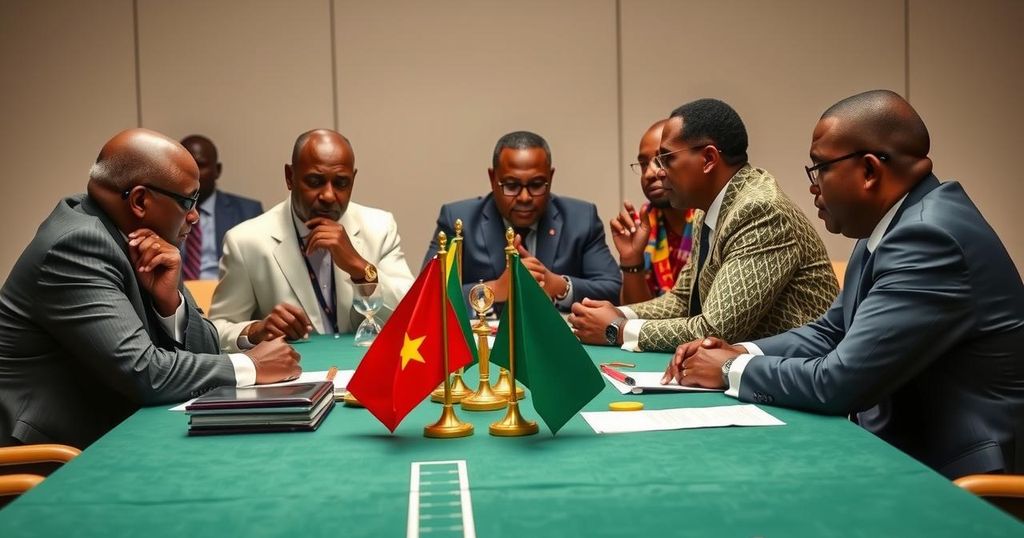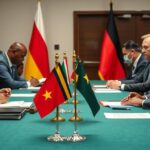Politics
ABUJA, AFRICA, ASIA, BASSIROU DIOMAYE FAYE, BURKINA FASO, CHINA, COUP, ECONOMIC COMMUNITY OF WEST AFRICAN STATES, ECONOMIC INTEGRATION, ECOWAS, ECOWAS COMMISSION, ECOWAS COUNCIL OF MINISTERS, ENVIRONMENTAL PROTECTION, FAURE GNASSINGBÉ, MALI, NIGERIA, OMAR TOURAY, REGIONAL COOPERATION, TINUBU, TOGOLESE, TOURAY, WEST AFRICA
Dante Raeburn
ECOWAS Provides Extension to Niger, Burkina Faso, and Mali for Exit Reassessment
ECOWAS grants a six-month grace period to Niger, Burkina Faso, and Mali to reconsider their exit, set from January 29 to July 29, 2025. The decision stems from their intent to withdraw as formal notifications were received, prompting the bloc to explore reconciliation efforts while preparing contingency plans for a potential exit.
The Economic Community of West African States (ECOWAS) has allowed Niger, Burkina Faso, and Mali a six-month period, from January 29 to July 29, 2025, to reconsider their planned exit from the organization. This decision followed a meeting on Sunday in Abuja, during the 66th Ordinary Session of the ECOWAS Heads of State and Government. Omar Touray, President of the ECOWAS Commission, acknowledged the notification from these nations regarding their intent to withdraw, which aligns with the provisions of the revised ECOWAS Treaty.
Although their formal membership is set to end on January 29, 2025, the Authority views this interim period as a chance for reconciliation and dialogue. “The Authority decides to set the period from January 29, 2025, to July 29, 2025, as a transitional period and to keep ECOWAS doors open to the three countries during the transition,” stated President Touray. The bloc has extended the mandates of prominent leaders to mediate discussions and foster cooperation with these countries.
As ECOWAS remains optimistic about retaining these nations, it is also preparing for the potential consequences of their exit. The body is formulating a detailed contingency plan to handle political and economic relations with them if they proceed with their withdrawal. Additionally, the ECOWAS Commission has been tasked with initiating the formal withdrawal process if necessary, with an extraordinary session planned for the second quarter of 2025 to finalize separation procedures and frameworks.
Nigerian President Bola Tinubu praised the leaders of ECOWAS for their efforts during the summit, underscoring the importance of unity in tackling regional issues. He urged member states to translate the summit’s outcomes into concrete benefits and emphasized the necessity of promoting peace, justice, democracy, and good governance throughout the region. The commitment of ECOWAS to cultivating a peaceful and prosperous West Africa remains resolute, with hopes that Niger, Burkina Faso, and Mali will choose to remain part of this community.
This article discusses the response of ECOWAS to the announced intent of Niger, Burkina Faso, and Mali to withdraw from the regional organization. The bloc’s leadership has offered a six-month period for these nations to reconsider their decision, demonstrating a commitment to dialogue and reconciliation. The background includes the legal framework of the ECOWAS Treaty and the regional challenges faced by member states, reflecting the significance of maintaining unity and collaboration in West Africa.
In summary, ECOWAS has afforded Niger, Burkina Faso, and Mali a six-month transitional period to reassess their planned departure from the organization. The initiative reflects the bloc’s desire to foster reconciliation and preserve strong regional ties. As preparations for potential separation are underway, the shared commitment to regional stability and collaborative governance remains at the forefront of ECOWAS’s agenda.
Original Source: businessday.ng








Post Comment